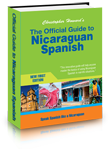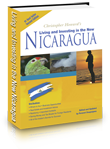Many people find the pace of life in Nicaragua very attractive, and decide to live here for a myriad reasons: warm year-round weather, a more tranquilo pace of life, the cost of living, starting over, tax benefits, affordable healthcare, hiding from Johnny Law (not endorsed), or looking for new love.
Whatever your motives may be for wanting to move to Nicaragua, there are a number of ways to remain in the country on a long-term basis.
Tourists from North America and many countries in Europe may now remain legally in the country for three months (90 days) without having to apply for permanent residency. You can get extensions on your tourist visa at Immigration offices, or you must leave the country every three months to renew your visa again upon reentry. If you remain here over your 90-day tourist visa, you will have to pay a nominal fee of several dollars for each day you stay over your expiration date. This can add up quickly if you lose track of time.

Foreign residents have to visit the Imigration Department in Managua
Unlike Costa Rica, Nicaragua does not appear to be cracking down on so-called “perpetual tourists” (people who live here by habitually renewing their tourist visa).
You don’t have to be a resident in Nicaragua to purchase property here or start a business. In many cases, being an investor here actually helps you to get residency status later on.
However, there are limitations to being a tourist. You are not technically allowed to open a bank account here as a tourist (some people do anyway) and buying a cell phone line (as opposed to “renting” a phone that functions on pre-paid cards) is more difficult, requiring creative solutions, such as buying a line in the name of a Nicaragua friend.
If you are a tourist, your status in the country is also at the whim of immigration authorities, who can deny your reentry into the country, even if you are already living here as a perpetual tourist.
If you plan to reside for an extended period of time in Nicaragua, applying for residency is a good idea.
NOTE: Once you are a resident of Nicaragua, you must get the government’s permission to leave the country. This is usually not difficult (you don’t have to come up with an elaborate tale for why you want to leave the country for a week), but it is something to consider before applying for residency. Foreign residents can also get a yearlong permission slip from the government that allows you to leave and enter as much as you like during that period. The yearlong permission slip costs $80, and is purchased at the Immigration Office in Managua. A onetime permission slip costs about $6, but the yearlong permission slip is highly recommended in case you need to leave the country quickly to attend to a family emergency or a health matter.
Steps to Applying for Residency
Foreigners can apply for Nicaraguan residency under several categories:
- Pensionado (retired, 45 or older)
- Rentista (45 or older, with steady monthly income from abroad)
- Investor
- Through marriage to a Nicaraguan
After purchasing the 10-córdoba (less than $1) Residency Solicitation Form from the Dirección General de Migración y Extranjería in Managua, applicants are asked to submit a letter of intent explaining – in Spanish – their motives for applying for Nicaraguan residency.
Applicants then must provide a certificate of income, whether it is from retirement checks, investments or business in Nicaragua or elsewhere. If the source of income is from a Nicaraguan business, a notarized letter must be provided demonstrating that the business is listed in the National Business Registry.
Applicants must be able to prove they have a steady monthly income of $600 for a single person. Each additional dependent is $100..
Applicants over the age of 16 must provide their hometown police records – or place of residence for last 6 months. Must be authenticated by a Nicaraguan Consulate nearest the applicant’s hometown, and by the Nicaraguan Foreign Ministry.
Applicants must then provide (in original copy, plus 2 photocopies):
A valid birth certificate, authenticated by the Nicaraguan Consulate in their home country and the Foreign Ministry.
A valid marriage certificate. If the applicant was married in a country other than Nicaragua, the certificate must be authenticated by the Nicaraguan Consulate and Foreign Ministry. Birth certificates for children born in Nicaragua.
Photocopies of all pages of their passport. The passport has to be valid for at least 6 months.
A clean bill of health with a home doctor’s medical certificate, authenticated by the Nicaraguan Consulate and Foreign Ministry.
Two passport photos.
Procedure: All above-mentioned documentation should be presented to either the Nicaraguan Tourism Institute’s (INTUR’s) Office of Judicial Affairs, in the main downtown Managua office (one block west of “Lips” strip club), or the main Immigration Office in Managua.
- The documentation and approve residency in no less than 3 days.
- Applicants coming to invest in Nicaragua must register with the MIFIC.
- Applicants forming their own companies must provide a business license or proof of business registration.
If approved, a new resident must pay about $81 in processing fees (not including lawyer’s fees), and an annual residency tax of $32, plus a monthly social security tax of $20. Approved applicants must also deposit into an Immigration bank account the amount equivalent to a one-way plane ticket back to their native country, according to Law 240. Once approved, new residents are allowed to import household goods or a car up to the value of $10,000 duty free.
Nicaraguan residents have to get the Nicaraguan government’s permission to leave the country, usually just a stamp with a minor fee.
Note: You’ll need an attorney to help you with your residency. We have provided a partial list of lawyers in this chapter. It is also a good idea to talk to other foreigners who have gone through the process of obtaining residency. They can usually recommend a good attorney. Lawyers usually charge around $1000 for helping you obtain your residency.
The country’s main immigration office is located in Managua. Dirección General de Migración y Extranjería Tel: (505) 2443989 can be reached by giving a taxi driver the following directions in Spanish: “ De los semáforos de la Tendrí 3 al lago or frente al Catastro or Antigua Instalaciones de INSS.“ However, any lawyer you hire should do all of your legwork. If you speak Spanish you’ll be pleased to know that there are lawyers, notaries and photographers who have small offices directly across from the immigration office. If you are in a jam any of these business can help you with your paper work.
For more information on immigration procedures and requirements, contact INTUR at This email address is being protected from spambots. You need JavaScript enabled to view it.




